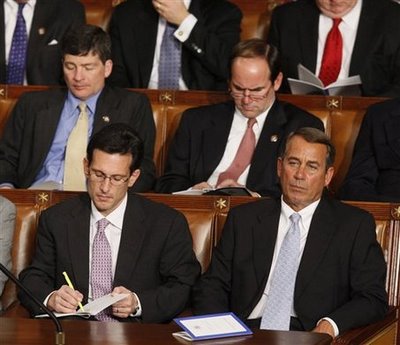So much for bipartisanship.

Even though his efforts to whip his party into passing a five-year transportation bill that attacks transit, biking, and walking have been fruitless, House Speaker John Boehner isn't about to follow through on his threat to take up the Senate's two-year bill. That bill passed with 22 GOP ayes (and 22 nays) in the Senate earlier this week.
Politico reported this morning that the House Transportation Committee still plans to take up something resembling Boehner's disastrous HR 7, but not before the eighth extension of SAFETEA-LU expires at the end of this month. The earliest the House plans to take up their bill is April 16, after the Easter recess – and it could be long after that.
While a Boehner spokesperson said no final decision had been reached, Joshua Schank of the Eno Center for Transportation said the speaker's threat to take up the Senate bill was always an empty one. "The Republican caucus would have revolted against it and Boehner would have lost this job," Schank said. "If [the Senate bill] passed [in the House], it would have passed because Democrats had voted for it. [House Majority Leader Eric] Cantor is breathing down his neck. If that happens, he’ll just say, ‘Look, you passed a bill that was a Democratic bill; it wasn’t a Republican bill. So he should be out; what kind of Republican leader is that?’"
Politico says the House will introduce a measure to extend SAFETEA-LU yet again the week of March 26, to give them time to pass their own bill. But there are several ways this plan could fail.
First, the Senate could very well obstruct the extension. Everyone involved has been pledging for many months now that there would be no more extensions. The Senate has done its job. Rather than enable the House to take up more and more time pushing its unpopular five-year bill, the Senate could play hardball and force the House’s hand. At that point, the House would either have to take up the Senate bill or let the nation’s transportation program lapse – at the cost of an estimated 847,294 jobs.
The second problem with the plan to take up the House bill yet again is the simple fact that that bill has not garnered enough support to pass it. The budget hawks are as vocal and powerful as ever, and they just won’t take up a bill as big as the House’s five-year bill. And although keeping dedicated funding for transit probably attracts more votes than it loses, some conservatives are dead-set against voting for a bill that continues the policy begun by Ronald Reagan of paying for transit with gas tax revenue.
The third problem is that the longer Congress waits to take up a bill the more meaningless it becomes. "What, are they going to work and kill themselves in conference to pass a bill that’s really only going to last one year?" said Schank. "So it pushes us closer and closer to an extension that kicks this through past the election."
Making this situation even more volatile is the fact that the expiration of the gas tax is now mixed in with the reauthorization. The timelines for the two measures used to be separate, but they coincided September 30 and were extended together, so now they both expire March 31.
Though the transportation bill gets far more airtime than the gas tax, the gas tax is the bedrock issue. After all, the bill can make all the funding commitments legislators want, but that funding has to come out of gas tax receipts. If those receipts don’t come in, there’s no funding. While gas tax extensions usually pass quietly and without fanfare, there’s always fear that the hyper-conservative House will suddenly rebel against anything called a “tax” and refuse to extend it.
The next two weeks sure will be interesting.





